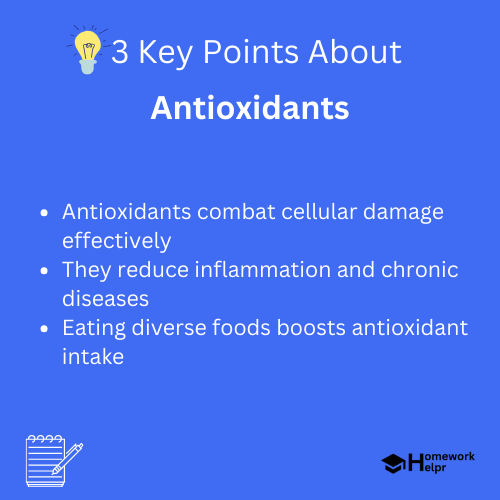📝 Summary
Antioxidants are crucial molecules that combat the harmful effects of free radicals, which can cause significant cellular damage. They can be categorized into enzymatic and non-enzymatic types, with sources including fruits, vegetables, nuts, and spices. A diet rich in antioxidants offers multiple health benefits, such as reducing inflammation, preventing chronic diseases, and supporting eye health. Integrating a variety of colorful foods into our diet can help maintain antioxidant levels, promoting overall wellbeing.
Understanding Antioxidants
In our body, numerous processes are constantly at work, and one of the most critical is the fight against harmful molecules known as free radicals. These molecules can cause cellular damage, leading to various health problems. Thankfully, the body has a defense system known as antioxidants that protects us from these damaging effects. In this article, we will dive into what antioxidants are, their types, sources, and health benefits.
What Are Antioxidants?
Antioxidants are molecules capable of stopping or slowing down the damage caused by free radicals. They do this by neutralizing these unstable molecules, which prevents cellular damage. Free radicals are generated during various processes, such as metabolism and exposure to environmental pollutants. Antioxidants play a vital role in maintaining our health and are a key part of our diet.
Definition
Free Radicals: Unstable atoms or molecules that can cause damage to cells, leading to various diseases.
Metabolism: The chemical processes that occur within a living organism to maintain life.
Types of Antioxidants
Antioxidants can be classified into two categories: enzymatic and non-enzymatic antioxidants. Understanding these categories helps us appreciate the various mechanisms at work in our bodies.
1. Enzymatic Antioxidants
These are enzymes produced by our bodies that help combat oxidative stress. Some notable enzymatic antioxidants include:
- Superoxide Dismutase (SOD): Converts free radicals into less harmful molecules.
- Catalase: Breaks down hydrogen peroxide into water and oxygen.
- Glutathione Peroxidase: Reduces hydrogen peroxide and helps detoxify harmful substances.
2. Non-Enzymatic Antioxidants
These antioxidants come from our diet and include vitamins and minerals that we must consume to benefit from their protective properties. Some common non-enzymatic antioxidants include:
- Vitamin C: Found in citrus fruits, strawberries, and bell peppers.
- Vitamin E: Present in nuts, seeds, and green leafy vegetables.
- Beta-carotene: Found in carrots, sweet potatoes, and spinach.
Sources of Antioxidants
Incorporating a variety of foods in our diet is essential to ensure we receive adequate antioxidants. Here are some rich sources:
- Fruits: Blueberries, grapes, oranges, and avocados.
- Vegetables: Broccoli, kale, spinach, and carrots.
- Nuts and Seeds: Walnuts, almonds, and sunflower seeds.
- Spices: Turmeric and cinnamon are also excellent sources.

Health Benefits of Antioxidants
Antioxidants come with a range of health benefits. Here are some notable advantages:
- Reducing Inflammation: Antioxidants help lessen the body’s inflammatory responses.
- Preventing Chronic Diseases: A diet rich in antioxidants can lower the risk of diseases such as heart disease and cancer.
- Supporting Eye Health: Certain antioxidants, like lutein, help protect our eyes from age-related damage.
Link to Aging
Research indicates that free radicals play a significant role in the aging process. Antioxidants that combat these radicals can contribute to a healthier aging process. This is particularly important as our cells undergo stress and potential damage over time.
❓Did You Know?
Did you know that blueberries are often considered a superfood due to their high antioxidant content? Eating them regularly can help improve your overall health!
Integrating Antioxidants into Your Diet
Including antioxidants in your diet is simple and delicious! Here are some tips:
- Variety is Key: Ensure you’re eating a colorful mix of fruits and vegetables.
- Snack Smart: Choose nuts or a fruit salad as healthy snacks instead of processed foods.
- Reduce Cooking Time: Overcooking vegetables can decrease their antioxidant levels, so steam or lightly sauté them instead.
By following these tips, you can help your body maintain its antioxidant levels and keep those pesky free radicals at bay!
Conclusion
Antioxidants are vital for our health as they protect our body from the damaging effects of free radicals. By understanding their types, sources, and benefits, we can make informed dietary choices to enhance our wellbeing. Remember to consume a variety of colorful fruits and vegetables to ensure you’re getting enough antioxidants in your diet. So, the next time you grab a snack, think about how you might be nourishing your body on a cellular level. Stay healthy and keep those antioxidants working for you!
Related Questions on Antioxidants
What are antioxidants?
Answer: Molecules that neutralize free radicals
Why are free radicals harmful?
Answer: They cause cellular damage leading to diseases
What foods are high in antioxidants?
Answer: Fruits, vegetables, nuts, and spices
How can I include antioxidants in my diet?
Answer: Eat a colorful mix of fruits and vegetables
